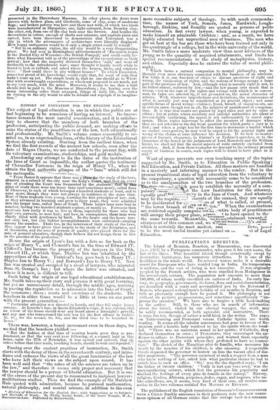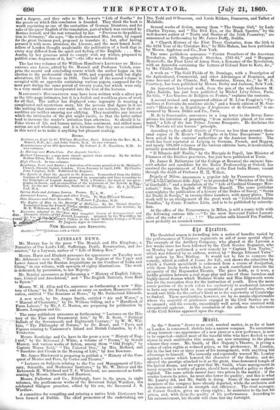PUBLICATIONS RECEIVED.
The Island of Reunion, Bourbon, or Mascarenhas, was discovered (A.n. 1505) by a Portuguese commander, who gave it his own name, the last of the three. This beautiful island, though occasionally swept by
destructive hurricanes, has numerous attractions. It is one of the healthiest in the whole world. Its mineral waters make it a desirable resort for Europeans who hare resided long in India. Its temperature is uniform, and the cost of living is not excessive. It was originally peopled by the French settlers, who were expelled from Madagascar in the seventeenth century. The population now amounts to more than 100,000, of whom nearly one-third are natives of India. Its early his- tory, its geography, government, its fauna, flora and social characteristics, are described with a ready and accomplished pen by the Reverend P. Beaton, who passed a clergyman's holiday of six months in Reunion, and tells us pleasantly enough how he passed it. His philosophy is not without its pietistic prepossessions, and sometimes superfluously "im- proves the occasion." We have also to forgive a little book-making in the author. Still, to those who are in search of information about the island, visited by our clerical voyager, the work may be safely recommended, as both agreeable and instructive. There is some fun too, though of rather a mild kind, in the writer. The paged on Table-turning and Protestant versus Catholic Spirits are worth reading. It seems all the tabular conversions had gone in favour of He- manism until a heretic lady resolved to lay the spirits whom she recal- led. "There was no uncertain sound in her spirits; if Catholic, they declared themselves in error ; if Protestants, they encouraged the ani dience to adhere to Protestant principles, and warned them especially against the other spirits with whom they professed to have no connec- tion." The sketch of the Mauritian Ore de famine, who measures his worth by the number of his children, is also amusing. A respectable Creole requested the governor to bestow on him the vacant office of dis- trict magistrate. "The governor surprised at such a request from a man who knew nothing of law, asked him what particular claims he had to entitle him to such an office. Sir,' was the the dignified reply, I am the father of twenty children." Voila le tort quo vous aver,' was the unsympathizing answer, which lost the governor his popularity and shocked the feelings of every pew de famine in the colony." Slavery, religion, Coolies, Africans, porpoises, dodos, sugar, and negroes, who un- like schoolboys, are, it seems, very fond of their cane, all receive some notice in the two volumes entitled Six MONTHS Ei REUNION.
The publishers of the English translation of Gormix's CORRESPONDENCE wrier A CHILD frankly announce in their prefatory note the. now unani- mous opinion of all German critics that this strange book 18 a romance and a forgery, and they refer to Mr. Lewes's "Life of Goethe" for the proofs on which this conclusion is founded. They think the book is worth reprinting as one of the curiosities of German literature, and for sake of the queer English of the translation, part of which was executed by Bettina herself, and the rest retouched by her. "Previous to its publica- tion in Germany," she says, "the well-renowned Mrs. Austin, by regard for the great German poet, proposed to translate it ; but, after having perused it with snore attention, the Literate, and the most famed book- sellers of London thought unadvisable the publication of a book that in every way differed from the spirit and feeling of the English. . . . Mrs. Austin, by her gracious mind to -comply with my wishes, proposed to publish some fragments of it, but"—the offer was declined.
The last two volumes of Sir William Hamilton's LECTURES ON META- PHYSICS AND Lome, edited by Dr. Mansell and Professor Veitch, com- prise the second and concluding course which the author began on his election to the professorial chair in 1836, and repeated, with but slight alterations, till his decease in 1856. One-half of the second volume is occupied with an appendix containing various papers' composed for the most part during the same period of twenty years, but which were only to a very small extent incorporated into the text of the lectures.
MAINSTONKS HOUSEKEEPER may have been written with a silver pen as the title-page intimates, but it is a foolish and worthless piece of work for all that. The author has displayed some ingenuity in weaving a complicated and mysterious story, but the persons that figure in it are like nothing that nature over made, or that art can tolerate, for their ab- surdities are neither amusing nor edifying. They neutralize any interest which the intricacies of the plot might excite, so that the latter rather tend to increase the reader's irritation than otherwise. So should it be. False views of life and human nature, false sentiment, and stilted man- nerism are not wholesome, and it is fortunate that they are so combined in this novel as to make it anything but pleasant reading.
Booxs.
Lectures on Logic by Sir William Hamilton, Bart. Edited by the Rev. H. L. Manse), B.D., &c., and John Veitch, M.A. In two volumes.
Reminiscences of an Old Sportsman. By Colonel J. P. Hamilton, K.H. In two volumes.
_Le Mariage aux Blots-Cnis. Par Auguste Cartier.
Herbert Chauncey; a man more sinned against than sinning. By Sir Arthur Hallam Elton, Bart. In three volumes.
High Church. In two volumes.
Epiphany, Lent, and Easter; a Selection of Sermons preached in St. Michael's Church. Chester Square, London. From January to April, 1860. By Charles John Vaughan, D.D. Published by Request.
The Epistle of Paul the Apostle to the Romans. Transcribed from the Editio Septima of Tischendorf, and arranged 4n paragraphs and lines according to the Principles of Logical Analysis. With a Preface ; the head of the para- graphs in Greek, and an exposition of the Argument of the Epistle_ in lid), for the use of Ministers, Students in Therstry,
fcrd, M.A.
Spring Buds and Autumn Leaves. Poems. riA. w. Autumnal Leaves. Elegiac and other Poe.11i. By Skin Diseases and their Remedies. By/Lbert M„t3111-Ward Thomas.' ' The Rights of Ilan in the Donp: ...ihrdan, M.D. Translated from the Prench).b H. E. Wilkinson, and C. A C. Clark. the speck' th 'salon of the Author), by of Medii:inc By Dr. Michel Granier. au on Exercises adapted to the 1, - d111.. Idiomatic Studies of theirfenewcharl a Complete Course of Grammatical and • le Use o guage. Adapted by the It ar Office for C.,Vdetsnof the Royal Military Colleges of Wool- Sandhurst. BYpiiguste Aigre de Charente.
NW' /DITTOES AND REPRINTS.
Goethe'seurresp;idence with a Child.



























 Previous page
Previous page